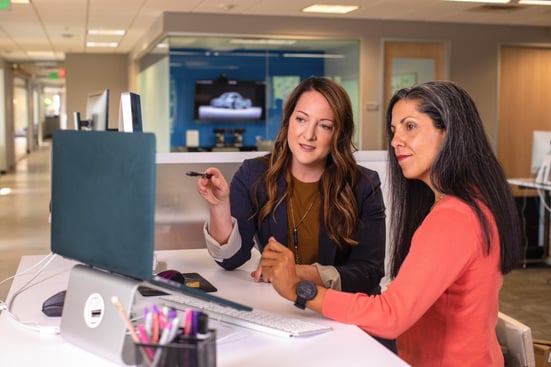Traditional behavioral health just wasn’t for me.
Always passionate about making a positive difference in people’s lives – my resume read like a typical social worker’s would with stints at schools, nonprofits, and county-run facilities all providing direct services to people in need. While all impactful places and organizations doing heartfelt and meaningful work, I knew that to expand my skillset and broaden my view of what care could look like, I would have to try something radically different which is how I came to evolvedMD.
One of the company’s first Behavioral Health Managers (frontline therapists) at the center of our enhanced Psychiatric Collaborative Care (CoCM) model, I am proud of what I’ve learned and accomplished during my three-year tenure in that role and have been honored to curate and share best practices from the field in my new role as Training Manager.
As Training Manager, I’m charged with training and onboarding all new Behavioral Health Managers before they join their collaborative care teams in the field. With our unique and enhanced model, most, if not all of our talented clinicians have no prior training in behavioral health integration or working embedded and alongside primary care providers. In my role, not only am I intent on making them more comfortable with our innovative model, ultimately creating champions for whole-patient care, but I also work hard to create an environment conducive to learning that will jumpstart their journeys to becoming better clinicians.
With a robust clinical programs team, evolvedMD has intentionally become a training powerhouse leveraging a comprehensive, clinically-validated curriculum designed to elevate even the most seasoned clinicians. Additionally, to ensure success with our model, I’ve added a few lessons to our playbook that I use with each new hire to help them better understand how to thrive as a behavioral health professional in modern primary care.
Maintain Confidence

When we embed our BHMs within a collaborative care team at the practices they serve, they are considered a provider—just like a Primary Care Provider. This provider label amplified my imposter syndrome tenfold in my early days as a BHM. I often didn’t feel comfortable questioning a doctor’s suggestions or sharing my insights on a patient’s condition. Even worse, this made me doubt my own skillset and behavioral health knowledge. Increased exposure, support from my clinical supervisor, and experience with CoCM helped my confidence over time, but from day one I make sure all new BHMs feel confident in what they bring to the table.
Essentially, I help them realize that they are the go-to mental health professional with extensive training and licensing in the behavioral health field. Also, it’s not like they stopped learning as soon as they graduated. From their onboarding week with me to our Clinical Management team providing ongoing support and training, our BHMs are constantly gaining new skills and growing in their roles. From there, I teach them to be vocal about their skillsets and knowledge, especially as they onboard at their respective practice. Even if their collaborative team is not in full agreement, there are ample opportunities for growth and development and their confidence shines through.
Set Boundaries With Your Patients, Practices, and Yourself
.jpeg?width=550&name=AdobeStock_250064219%20(3).jpeg)
In a traditional therapy setting, clinicians aren’t nearly as exposed to patients with comorbidities compared to working in our CoCM model. At evolvedMD, our BHMs must understand that they are collaborating with medical providers to address both physical and mental health needs. And often times, this is likely a patient’s first foray in collaborative care and having access to a licensed therapist in the same building as their primary care provider. The process looks and works differently than a traditional setting, but teaching BHMs to set healthy emotional, intellectual, and time boundaries with patients and practices ensure a productive relationship that ultimately drives improved outcomes.
In setting boundaries for yourself, it’s about intentionally scheduling time to practice self-care during the workday. Many of our clinicians came to evolvedMD because of heavy caseloads, unrealistic demands, and burnout at their previous jobs. Even then, some new BHMs struggle to take time for themselves because they’re used to jumping from appointment to appointment and catching up on case notes. At evolvedMD, we’ve cultivated a culture around wellness and self-care with the philosophy that good culture drives good business. That means if we take good care of our people and give them space to practice self-care, they will deliver exceptional care to patients.
Practice Time Management

Before evolvedMD, one of the first lessons I learned as a clinician is that you must maintain a harmonious relationship with your time. Basically, if our BHMs don’t manage their time well then they could be catching up on notes and other tasks after hours. This not only betrays evolvedMD’s focus on striking a working life-balance but also leads to frustration and an inability to be present for patients and providers, resulting in lower-quality care.
Utilizing the scheduling system within the Electronic Health Record helped me stick to the allotted appointment time block per the CoCM and collaborate closely with medical providers. With flexibility in mind, I tell BHMs to use whatever tools they think will help, such as using the Electronic Health Record’s scheduling system to maintain appointments for their allotted time blocks, using the timer on their phones when catching up on notes, using Outlook to schedule trainings with their clinical supervisor for professional development, and whatever else crops up during the day. I also make sure to tell them to schedule time for self-care, to take a lunch break, time for their families, and anything else that matters in their personal lives. Owning their time helps them become better clinicians by preventing burnout and being more present with patients and providers.
Integrate and Collaborate

It’s never easy being the new person at work. Our BHMs, in a sense, have to be the new person twice: the first time joining evolvedMD and second joining their primary care practice. However, they spend nearly 100% of their time onsite and in person at their assigned practice. Sometimes the best way to grow is to leave your comfort zone, and I truly believe that being proactive about integrating with my practice’s collaborative care team helped me become a better clinician.
I often tell BHMs that building rapport with practice employees is critical to their success as a clinician. Rather than isolating themselves in their offices, I encourage them to work closely with their team while also maintaining a presence in their clinics. Not only does a collaborative team provide more comprehensive care, but it also offers ample opportunity for our BHMs to learn more about treating patients with comorbidities and how physical and mental health are intertwined.
Join Us
If you’re looking to join a radically different company that prioritizes your personal and professional development as a therapist, I highly encourage you to join our team at evolvedMD. Having the opportunity to grow my skills as a BHM in an integrated care setting has been an incredible experience. With ongoing support from the Clinical Management team, fellow BHMs, and your collaborative care team, I am confident you won’t find a greater support system that puts your learning and well-being first.
Want to grow your skills as a mental health professional? Join evolvedMD.
Submit your resume to recruiting@evolvedmd.com or apply via our Careers page.